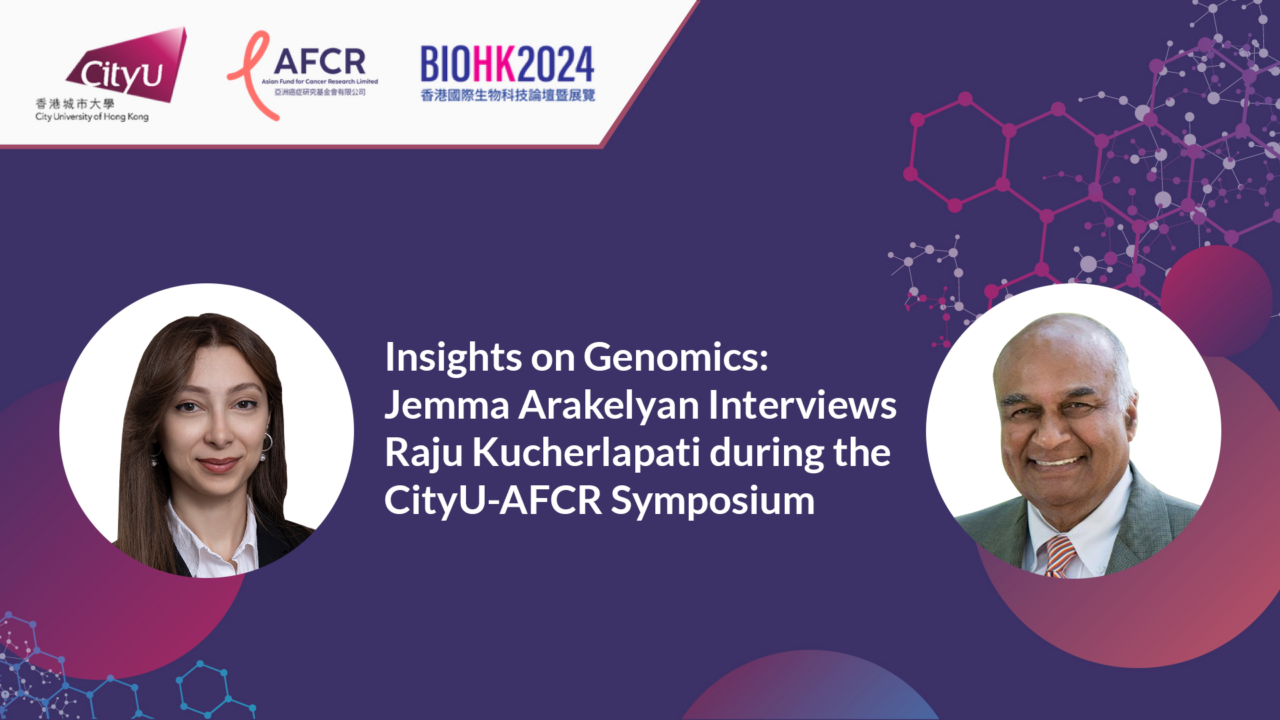During the CityU-AFCR Symposium at BioHK 2024 on September 12-13, Dr. Jemma Arakelyan interviewed Dr. Raju Kucherlapati, Professor of Genetics and Medicine at Harvard Medical School.
Dr. Jemma Arakelyan is a medical oncologist and the chief executive officer of The Institute of Cancer and Crisis. She is a Ph.D. candidate at the City University of Hong Kong. Her research focuses on developing new anticancer treatments and understanding the underlying mechanisms of cancer progression.
In addition to her academic pursuits, she is an active member of several scientific organizations, including the European School of Oncology (ESO), where she served as an ambassador in Armenia from 2020-2022.
Dr. Kucherlapati is a Professor of Genetics and Medicine at Harvard Medical School. He obtained his PhD degree from the University of Illinois, trained at Yale University and was a faculty member at Princeton University, University of Illinois and Chairman of the Department of Molecular Genetics at the Albert Einstein College of Medicine. He joined the Harvard faculty in 2001 and was the first Scientific Director of the Harvard-Partners Center for Genetics and Genomics.
His research interests are in the areas of human genetics, gene-modification, genomics and cancer genetics and genomics. He is a fellow of the American Association for the Advancement of Science and is a member of the National Academy of Medicine of the US. He was a member of a Presidential Committee during the administration of President Obama. He also founded several successful biotechnology companies.
The CityU-AFCR Symposium on Precision Medicine and Digital Medicine took place from 12-13 September as part of BIOHK2024, in Hong Kong Convention and Exhibition Centre. The symposium showcased presentations by experts in precision medicine, providing a dynamic platform for the exchange of innovative ideas and fostering a collaborative environment for advancements in the biotechnology field.

Jemma Arakelyan: Dr. Kucherlapati, can you discuss the role of recent advancement in genetic research that have contributed to the development of diagnostics and treatments of various cancer types?
Raju Kucherlapati: One of the big revolutions as a result of that is that new DNA sequencing technologies now enable diagnostic measures for many, many different disorders. For example, it turns out that in the United States and many other places, women who are 35 years and older, if they become pregnant, the doctors would recommend that they would do a fetal genetic testing. In the past, fetal genetic testing was done through amniocentesis or chorionic villus sampling. And both of them are invasive ways of obtaining fetal cells from the pregnant mother to find out if there is anything wrong with the fetus. Now, we are able to take a small amount of blood from the pregnant mother, and examine the DNA. This is a huge revolution.
Jemma Arakelyan: That’s amazing. And how do you envision the future?
Raju Kucherlapati: The example that I provided to you right now has already revolutionized pre-natal diagnosis. Similarly, it turns out that in China, every year, a large number of children are born. The one-child policy doesn’t exist anymore, there are more births. And it turns out about 5% of the newborns have some type of birth defects. In the past, it was not really possible to easily identify what the defect is. Now, we can use DNA sequencing to to determine any genetic changes in a relatively short period of time, like within a week. And if there’s something wrong with it, you’ll be able to find out what is wrong with this child.
This is turning out to be very important, that you’d be able to prevent important diseases or identify diseases very early, so you’d be able to treat them. As a result of this deep knowledge, pharmaceutical companies and biotech companies have recognized the importance of them and using that information, develop new drugs and therapies. That’s also revolutionizing changes enormously.
Many diseases that were considered to be incurable 20-25 years ago, now have treatments for them. An example of that is cystic fibrosis, a relatively common, childhood disorder. Today, it turns out that a company, in the United States developed a new drug which is capable of treating children with this disease.
Precision medicine is also impacting the way that we deal with cancer patients. Cancer was diagnosed and classified on the basis of where it came from. If a tumor came from the lung, it was lung cancer. If it came from the breast, it was breast cancer and so on. But it turns out that cancer is not, monolithic. It is now possible to be able to classify the different tumors into different subcategories based upon the genetic changes that the tumor has. Over the last 20 years, pharmaceutical companies have been able to develop new drugs that are called cognitive therapies. They are given only to those patients who have particular types of genetic changes. In the case of lung cancer, one of the most important cancers in Asia, the third most important drug of a cognitive therapy was actually developed in China and became very popular.
Asia is going to be a very powerful place in developing new ideas, new technologies, new drugs that will be able to not only affect the population in Asia but affect the populations around the world.
Jemma Arakelyan: Very interesting. Thanks a lot for your response.
Can you tell us a bit about ethical considerations? I know that you have been in an ethical committee and you are now as well. Can you tell us what is allowed to do in genetic research and what is not. When they are crossing the line, what we can’t do as humans?
Raju Kucherlapati: There are many different types of genetic research. Much of the genetic research, like the ones that I described to you, is like being able to extract the DNA from the blood of a human being and being able to do the analysis.
They are all considered to be lifesaving and there are no ethical issues with those types of things. However, there are other types. It is possible to be able to take embryos and be able to generate the cell lines from it.
And in animals such as in mice, it has been shown that you could take these cells and then generate new embryos and new organisms. And that kind of research in most countries around the world is prohibited because manipulating a human in a genetic delineation is considered to be unethical.
In many cases, at least in the case of research, people have to think about the ethics of the kind of research that they are doing. And sometimes many hospitals and academic institutions, universities, have boards that consider ethical considerations and ensure that everything is okay. The other type of ethical considerations is that you want to be able to treat all humans equally. You should not discriminate people on the basis of their skin color or national origin or some other types of features. It’s also important to be able to ensure that we treat everybody equally.
For example, if a new drug is developed, that new drug could not be just given to people who are very rich or who can afford it. You want to be able to give it to the whole population. And you need to be thinking about the ethical considerations of all of those types of things.
But once you’ve found a company with these types of considerations in designing the research and executing research, it’s always important to be able to think before you do something.
Jemma Arakelyan: Thanks a lot for your time.
More posts featuring CityU-AFCR Symposium.


